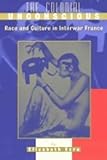The Colonial Unconscious : Race and Culture in Interwar France / Elizabeth Ezra.
Material type: TextPublisher: Ithaca, NY : Cornell University Press, [2018]Copyright date: ©2000Description: 1 online resource (192 p.) : 15 halftonesContent type:
TextPublisher: Ithaca, NY : Cornell University Press, [2018]Copyright date: ©2000Description: 1 online resource (192 p.) : 15 halftonesContent type: - 9781501724046
- 305.84/1/009042 21
- online - DeGruyter
| Item type | Current library | Call number | URL | Status | Notes | Barcode | |
|---|---|---|---|---|---|---|---|
 eBook
eBook
|
Biblioteca "Angelicum" Pont. Univ. S.Tommaso d'Aquino Nuvola online | online - DeGruyter (Browse shelf(Opens below)) | Online access | Not for loan (Accesso limitato) | Accesso per gli utenti autorizzati / Access for authorized users | (dgr)9781501724046 |
Browsing Biblioteca "Angelicum" Pont. Univ. S.Tommaso d'Aquino shelves, Shelving location: Nuvola online Close shelf browser (Hides shelf browser)

|

|

|

|

|

|

|
||
| online - DeGruyter Milton's Imperial Epic : Paradise Lost and the Discourse of Colonialism / | online - DeGruyter The Cross and the Sickle : Sergei Bulgakov and the Fate of Russian Religious Philosophy,1890–1920 / | online - DeGruyter Racism and Justice : The Case for Affirmative Action / | online - DeGruyter The Colonial Unconscious : Race and Culture in Interwar France / | online - DeGruyter Milton among the Philosophers : Poetry and Materialism in Seventeenth-Century England / | online - DeGruyter Monks and Nuns, Saints and Outcasts : Religion in Medieval Society / | online - DeGruyter Feminism Confronts Homo Economicus : Gender, Law, and Society / |
Frontmatter -- Contents -- Illustrations -- Preface -- Introduction. Colonial Culture -- 1. Colonialism Exposed -- 2. Raymond Roussel and the Structure of Stereotype -- 3. Cannibals in Babylon: Rene Crevel's Allegories of Exclusion -- 4. A Colonial Princess: Josephine Baker's French Films -- 5. Difference in Disguise: Paul Morand's Black Magic -- Epilogue: Black-Blanc-Beur -- Notes -- Bibliography -- Index
restricted access online access with authorization star
http://purl.org/coar/access_right/c_16ec
France between the two World Wars was pervaded by representations of its own colonial power, expressed forcefully in the human displays at the expositions coloniales, films starring Josephine Baker, and the short stories of Paul Morand, and more subtly in the avant-garde writings of René Crevel and Raymond Roussel. In her lively book, Elizabeth Ezra interprets a fascinating array of cultural products to uncover what she terms the "colonial unconscious" of the Jazz Age—the simultaneous attraction and repulsion of exoticism and the double bind of a colonial discourse that foreclosed the possibility of the very assimilation it invited.Ezra situates the apotheosis of French colonialism in relation to both the internal tensions of the colonial project and the competing imperialisms of Great Britain and the United States. Examining both the uses and the limits of psychoanalytic theories of empire, she proposes a reading of French colonialism which, while historically specific, also contributes to our understanding of contemporary culture. The enduring legacy of empire is felt to this day, as Ezra demonstrates in a provocative epilogue on the remarkable similarities between the rhetoric of colonial France and accounts of the French victory in the 1998 World Cup.
Mode of access: Internet via World Wide Web.
In English.
Description based on online resource; title from PDF title page (publisher's Web site, viewed 26. Apr 2024)


